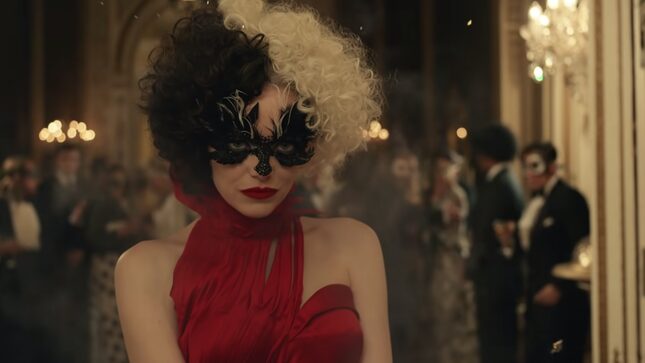

I dreaded watching Cruella, Disney’s new retooling of the 101 Dalmations villain’s backstory, because I knew at work today, I’d be expected to have a “take.” And before I even reluctantly paid my $37 bucks for a month of Disney+ access, along with some sort of “Premium” viewing privilege that allowed me to view the film, I knew what I was probably going to say: Our culture will do anything to excuse a rich white woman’s villainy, something about girlbosses and capitalism, et cetera, et cetera. I’ve said it all before, and on Friday, similar takes on the film had already begun rolling in while Twitter laughed at the film’s ridiculous inciting incident: A pack of vicious dalmatians killed Cruella’s mother, setting her on a collision course with her own villainy.
And guess what? The film doesn’t get less ridiculous after that. It’s completely silly—Main character Estella (nicknamed Cruella by her late mother for her tendency to give in to meaner impulses) is a societal misfit, fistfighting bullies until she’s ejected from boarding school, embarking on a life of grifting with two other urchins named Horace (Paul Walter Hauser) and Jasper (Joel Fry) and a couple of very adorable criminal dogs. When Estella (played by Emma Stone) takes a dream job at a prominent London fashion house, the cruelty of her boss, The Baroness (Emma Thompson clearly loving her chance to have her own Devil Wears Prada moment) inflames her dormant cruelty, locking the two in a hijinks-saddled battle to both deliver their lines in the most offhandedly arrogant way possible, outdo each other on the runway, and then eventually do murder to a soundtrack of commercially successful classic rock songs pared down to a faux-arty Starbucks CD aesthetic with a lot of stunning shots of really, really good clothes. Cruella is nothing, really, and that feels so welcome after the past year of serious, deadly news with hourly headlines giving every reason in the world to shake with fear and rage. It’s an airplane movie just in time for us to maybe even go on an airplane again. The film is far too long, at two-plus hours, but there are much worse ways to spend around 140 minutes, such as reading internet indignation that a massively budgeted Disney blockbuster on an exorbitantly priced streaming app didn’t perform its socialist feminism well enough to be exalted as a masterpiece in a college classroom.
-

-

-

-

-

-

-

-

-

-

-

-

-

-

-

-

-

-

-

-

-

-

-

-

-

-

-

-

-

-

-

-

-

-

-

-

-

-

-

-








































